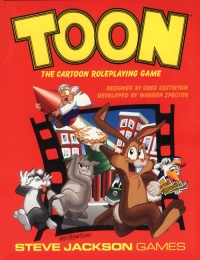Toon (role-playing game)
 |
|
| Designer(s) | Greg Costikyan, Warren Spector |
|---|---|
| Publisher(s) | Steve Jackson Games |
| Publication date | 1984 |
| Genre(s) | Comedy |
| System(s) | Custom |
Toon is a role-playing game in which the players take the roles of cartoon characters. It is subtitled The Cartoon Roleplaying Game.Toon was designed by Greg Costikyan and developed by Warren Spector, and first published in 1984 by Steve Jackson Games.
Jeff Dee came up with the idea of creating a role-playing game based on cartoons when he, Greg Costikyan, and several other designers were talking about genres for which game systems had not yet been designed; although they agreed that such a game would be impossible to design, a few years later Costikyan designed Toon as a full game with the assistance of Warren Spector.
Although Toon is a genuine role-playing game requiring the participation of players and a game master (called the "Animator"). It is designed with a tongue-in-cheek style that deliberately parodies many of the conventions of more standard, "serious" role-playing games.
In Toon the player characters never die. As in many role-playing games, characters have hit points, which are deducted when the character is injured (usually in combat, or by having anvils fall on them). When characters are reduced to zero hit points they do not die or fall unconscious, but fall down. Since cartoon characters never actually die, and always return in time for the next scene, a fallen down character returns to play a set time later, with all hit points restored.
This lack of true "character death" is also designed to encourage players to deliberately abandon the skills and reflexes they learned in other games, namely to have their characters able to solve problems and fight enemies while staying alive. According to the game's rules, the two prime directives for Toon players to follow are "Forget Everything You Know" and "Act Before You Think".
The game encourages players to have fun above all other considerations - even to the point of breaking the rules of the game. If the players and the Animator agree that a players' actions in a game are funny and enjoyable, then that players' actions are allowed and encouraged. This can be seen as a way for players to "break the fourth wall" in the game, in the same way that animated cartoons often ignore reality for the sake of laughs.
...
Wikipedia
